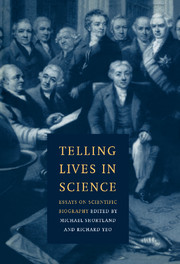Book contents
- Frontmatter
- Contents
- List of contributors
- Preface
- Introduction
- 1 Existential projects and existential choice in science: science biography as an edifying genre
- 2 Life-paths: autobiography, science and the French Revolution
- 3 From science to wisdom: Humphry Davy's life
- 4 Robert Boyle and the dilemma of biography in the age of the Scientific Revolution
- 5 Alphabetical lives: scientific biography in historical dictionaries and encyclopaedias
- 6 The scientist as hero: public images of Michael Faraday
- 7 ‘Tactful organising and executive power’: biographies of Florence Nightingale for girls
- 8 Taking histories, medical lives: Thomas Beddoes and biography
- 9 The scientist as patron and patriotic symbol: the changing reputation of Sir Joseph Banks
- 10 Metabiographical reflections on Charles Darwin
- Index
10 - Metabiographical reflections on Charles Darwin
Published online by Cambridge University Press: 28 October 2009
- Frontmatter
- Contents
- List of contributors
- Preface
- Introduction
- 1 Existential projects and existential choice in science: science biography as an edifying genre
- 2 Life-paths: autobiography, science and the French Revolution
- 3 From science to wisdom: Humphry Davy's life
- 4 Robert Boyle and the dilemma of biography in the age of the Scientific Revolution
- 5 Alphabetical lives: scientific biography in historical dictionaries and encyclopaedias
- 6 The scientist as hero: public images of Michael Faraday
- 7 ‘Tactful organising and executive power’: biographies of Florence Nightingale for girls
- 8 Taking histories, medical lives: Thomas Beddoes and biography
- 9 The scientist as patron and patriotic symbol: the changing reputation of Sir Joseph Banks
- 10 Metabiographical reflections on Charles Darwin
- Index
Summary
If we suppose that what is produced in cultural practice is a series of objects, we shall … set about discovering their components. … But I am saying that we should look not for the components of a product but for the conditions of a practice. When we find ourselves looking at a particular work, or group of works, often realising, as we do so, their essential community as well as their irreducible individuality, we should find ourselves attending first to the reality of their practice and the conditions of the practice as it was then executed.
Raymond WilliamsNavel-gazing is not a noted source of historical insight but a personal perspective is essential to this chapter: in 1991 Adrian Desmond and I published a best-selling biography of Charles Darwin. In reflecting on our collaboration I intend that a biographical, not an egotistical, spirit should prevail.
An early reviewer of our Darwin felt moved to associate it with a text from that famous study of modern industrialism, Roald Dahl's Charlie and the Chocolate Factory. Here is the scene witnessed by the book's hero Charlie Bucket in the proprietor's ‘Inventing Room’:
Mr Wonka himself had suddenly become even more excited than usual, and anyone could see that this was the room he loved best of all. He was hopping about among the saucepans and the machines like a child among his Christmas presents, not knowing which thing to look at first. […]
- Type
- Chapter
- Information
- Telling Lives in ScienceEssays on Scientific Biography, pp. 267 - 282Publisher: Cambridge University PressPrint publication year: 1996
- 4
- Cited by



